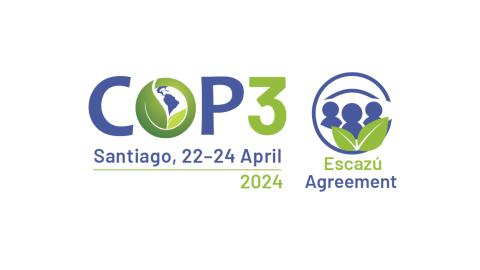
22-24 Apr 2024 Santiago, Chile | Conferences and meetings of subsidiary bodies
At the third meeting of the Conference of the Parties (COP 3) to the Regional Agreement on Access to Information, Public Participation and Justice in Environmental Matters in Latin America and the Caribbean – known as the Escazú Agreement – countries adopted the Decision on Mainstreaming the Gender Perspective, which poses the urgency of integrating and strengthening the gender perspective, of ensuring the full and effective participation of women in all their diversity, including indigenous women, and of preventing discrimination and gender-based violence against women who are environmental defenders. This represents a significant milestone for sustainable development in Latin America and the Caribbean.
To analyze this topic, the Dialogue “The fundamental role of women and the mainstreaming of the gender perspective in the implementation of the Escazú Agreement” was held on the sidelines of the COP 3, convened by the Secretariat of Foreign Affairs of Mexico and the Economic Commission for Latin America and the Caribbean (ECLAC) along with the Foreign Ministries of Chile and Colombia, and sponsored by GIZ/BMZ.
During the event’s opening session, ECLAC’s Executive Secretary José Manuel Salazar-Xirinachs emphasized, via video, that “the Escazú Agreement is a historic milestone for our region and for the world,” adding that “we at ECLAC sustain that investing in gender equality and in the care society is essential, not just for reasons of justice and inclusion, but also as a strategic investment to energize the economy and accelerate progress towards sustainable development.” The senior United Nations official called for creating synergies between the Escazú Agreement and the Regional Gender Agenda, which has been forged over the last 45 years via the agreements approved by governments at the meetings of the Regional Conference on Women in Latin America and the Caribbean.
Meanwhile, Alicia Bárcena, the Foreign Minister of Mexico – which is the country that promoted the decision’s adoption – indicated that this proposal is aligned with the principles of Mexico’s Feminist Foreign Policy, which entails an approach that is more humanistic, pacifist and focused on protecting human rights, which includes the protection of and the right to a healthy environment. “The decision on mainstreaming the gender perspective in the Escazú Agreement arises from the undeniable recognition of the relationship between gender equality, environmental protection and the right to information and to justice. This initiative serves to render visible the critical participation that we women have had in the entire process of drafting the Escazú Agreement as well as its entry into force,” she emphasized in a pre-recorded message.
At the dialogue, participants presented the experiences of Mexico, Antigua and Barbuda, Chile and Colombia, with comments from the elected representative of the public for the Escazú Agreement as well as specialists from the United Nations Entity for Gender Equality and the Empowerment of Women (UN Women), the United Nations Development Program (UNDP), the International Union for Conservation of Nature (IUCN) and the GIZ office in the Southern Cone.
The speakers stressed the importance of creating synergies with all relevant stakeholders to promote structural and ambitious responses, as established in the Decision, starting with the full and effective participation of women and of the Machineries for the Advancement of Women, and the incorporation of a gender-equality perspective into the implementation of the Agreement, particularly in national implementation plans and road maps. It is also urgently necessary to develop gender statistics and build national capacities, prevent discrimination and gender-based violence against women defenders, and also create a safe environment for the defense of human rights in environmental matters, they contended.
The third meeting of the Conference of the Parties (COP 3) to the Escazú Agreement took place at ECLAC’s main headquarters on April 22-24, 2024.